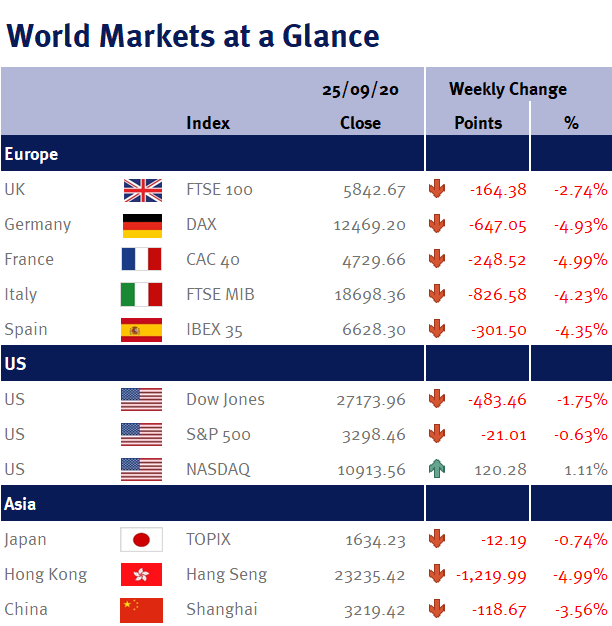As you can see from the accompanying table, global equity markets ended the week lower.
Week ending 25th September 2020.
28th September 2020

Journalists love a good negative story and they have been kept busy this week arguing that the resurgence in coronavirus cases (especially given the cooling autumn weather) and the resulting new restrictions will undermine the economic recovery and keep us in a recession.
However, a little perspective is currently needed when assessing the state of equity markets, as US politics has been this week’s main driver.
While we can’t deny that the coronavirus hasn’t stopped impacting the global economy and fresh restrictions/lockdowns will slow the economic recovery, today is very different from those dark days we experienced earlier in the year.
For starters, we do not believe we will see a return of the severe lockdowns that devastated global economic activity (consumption, investment and production) during the first half of the year as not only would this be unpalatable from both a political and economic standpoint, but more importantly because today’s death count is far lower.
Secondly, we are starting to see some very encouraging coronavirus vaccine developments – and of course, a vaccine will allow economies to fully reopen and thus speed up the economic recovery.
As a consequence, while we acknowledge that the resurgence in coronavirus infections coupled with the new set of restrictions has the potential to hurt the employment market by increasing the risk of further redundancies, which in turn could lower consumption, it will probably only dampen the economic recovery from the current ‘V-shape’ to a ‘Nike Swoosh’ (i.e. still a strong recovery, just slightly slower).
However, we believe what is currently more important to focus on is US politics.
For starters, politicians in Washington, from both sides of the aisle, continue to play brinkmanship which is stopping the provision of economic stimulus to struggling consumers and businesses. This was also echoed this week by Jay Powell, the Fed Chair, in a warning that the economic recovery still has a long way to go and that while the Fed has provided support through monetary stimulus, now is the time for politicians to provide fiscal stimulus.
Unfortunately, the death of Ruth Bader Ginsburg last week (18 September 2020) appears to have further significantly reduced the chances of the two sides agreeing any new stimulus ahead of the US Presidential election on Tuesday 3 November 2020.
Furthermore, the election has all the hallmarks of being very contentious. Thanks to the coronavirus outbreak, we expect a record number of postal votes – and as such, vote counting could easily drag on for several days after the Election. Also, if the vote is exceptionally close (as it was in 2000, between George Bush and Al Gore), it could end up being decided in the courts; especially as Donald Trump has refused to commit to a peaceful transfer of power if he loses the election to Joe Biden.
History has shown us that global equity markets can deal with any eventuality, but hates periods of uncertainty – and the US election is a big uncertainty.
However, we believe it is a fools’ errand attempting to predict the potential global equity market reaction for different election outcomes – for example, market commentators predicted equity markets would decline on a Donald Trump victory in 2016, but they actually rose.
Additionally, it is important to note that while it is very tempting to get caught up in political narratives as the stakes may appear particularly high over this election, it is important to remember that the US economy has withstood many catastrophes, panics and even pandemics – not to mention political uncertainties.
Although we fully appreciate that you may find the current equity market weakness unnerving, we believe it is simply the markets dealing with political uncertainty and therefore a short-term issue – and as such we believe it is very important to maintain a long-term perspective and resist the urge for any knee-jerk reactions.
We believe the big positive underlying growth drivers remain in place, and this is unfortunately just a stomach-churning period – as we have previously stated, there will always be periods of market uncertainty and volatility and this current period is no different, that is why my wealth takes a long-term approach to investing, as evidence shows that this leads to better outcomes, as time in the market is more important than trying to time the market.
This week’s focus will be on the first debate between Donald Trump and Joe Biden (Tuesday 29 September 2020).
Data wise, all eyes will again be on the US weekly jobless claims (Thursday 1 October 2020) and Friday’s (2 October 2020) US employment data (non-farm payrolls; unemployment rate; participation rate; and average earnings). Other US data includes US PCE (the Fed’s favoured inflation measure) and ISM data.
Elsewhere we have Chinese PMI; and Eurozone CPI inflation, economic confidence and unemployment rate.
Investment Management Team
The latest market updates are brought to you by Investment Managers & Analysts at Wealth at Work Limited which is a member of the Wealth at Work group of companies.
Links to websites external to those of Wealth at Work Limited (also referred to here as 'we', 'us', 'our' 'ours') will usually contain some content that is not written by us and over which we have no authority and which we do not endorse. Any hyperlinks or references to third party websites are provided for your convenience only. Therefore please be aware that we do not accept responsibility for the content of any third party site(s) except content that is specifically attributed to us or our employees and where we are the authors of such content. Further, we accept no responsibility for any malicious codes (or their consequences) of external sites. Nor do we endorse any organisation or publication to which we link and make no representations about them.

